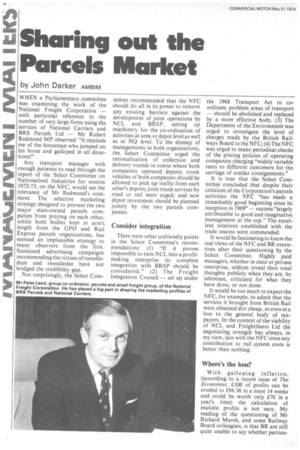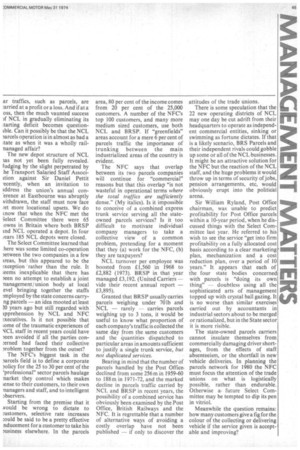Sharing out the Parcels Market
Page 46

Page 47

If you've noticed an error in this article please click here to report it so we can fix it.
by John Darker AMB1M WHEN a Parliamentary committee was examining the work of the National Freight Corporation — with particular reference to the number of very large firms using the services of National Carriers and BRS Parcels Ltd — Mr Robert Redmond MP observed: "It reminds me of the horseman who jumped on his horse and galloped in all directions!"
Any transport manager with enough patience to read through the report of the Select Committee on Nationalised Industries for session 1972-73, on the NFC, would see the relevance of Mr Redmond's comment. The selective marketing strategy -designed to prevent the two major state-owned parcels companies from preying on each other, whilst both bodies kept at arm's length from the GPO and Rail Express parcels organizations, has seemed an implausible strategy to many observers from the first. Sustained advertising campaigns recommending the virtues of tweedledum and tweedledee have not bridged the credibility gap.
Not surprisingly, the Select Corn mittee recommended That the NFC should do all in its power to remove any existing barriers against the development of joint operations by NCL and BRSP, setting up machinery for the co-ordination of activities at area or depot level as well as at HQ level. To the dismay of managements in both organizations, the Select Committee urged the rationalization of collection and delivery rounds in towns where both companies operated depots; trunk vehicles of both companies should be allowed to pick up traffic from each other's depots; joint trunk services by road or rail were urged; and new depot investment should be planned jointly by the two parcels companies.
Consider integration
There were other unfriendly points in the Select Committee's recommendations: (I) "If it proves impossible to turn NCL into a profitmaking enterprise its complete integration with BRSP should be considered." (2) The Freight Integration Council — set up under the 1968 Transport Act to coordinate problem areas of transport — should be abolished and replaced by a more effective body. (3) The Department of the Environment was urged to investigate the level of charges made by the British Railways Board to the NFC; (4) The NFC was urged to make periodical checks of the pricing policies of operating companies charging "widely variable rates to different customers for the carriage of similar consignments."
It is true that the Select Committee concluded that despite their criticism of the Corporation's parcels activities the NFC "has made a remarkably good beginning since its inception in 1969" — success "largely attributable to good and imaginative management at the top." The excellent relations established with the trade unions were commended.
It would be fascinating to know the real views of the NFC and BR executives after their questioning by the Select Committee. Highly paid managers, whether in state or private enterprise, seldom reveal their total thoughts publicly when they are, by inference, criticized for what they have done, or not done.
It would be too much to expect the NFC, for example, to admit that the services it brought from British Rail were obtained dirt cheap, or even at a loss to the general body of taxpayers. In the context of the viability of NCL and Freightliners Ltd the negotiating strength has always, in my view, lain with the NFC since any contribution to rail system costs is better than nothing.
Where's the loss?
With galloping inflation, (according to a recent issue of The Economist, £100 of profits can be eroded to £96.38 in a mere 14 weeks and could be worth only £70 in a year's time) the calculation of realistic profits is not easy. My reading of the questioning of Mr Richard Marsh, and some Railway Board colleagues, is that BR are still quite unable to say whether particu ar traffics, such as parcels, are arried at a profit or a loss. And if at a oss, then the much vaunted success NCL in gradually eliminating its tailing deficit becomes questionrble. Can it possibly be that the NCL 3st-eels operation is in almost as bad a ;tate as when it was a wholly railnanaged affair?
The new depot structure of NCL ms not yet been fully revealed. fudging by the slight perpetrated by he Transport Salaried Staff Associition against Sir Daniel Pettit .ecently, when an invitation to iddress the union's annual conerence at Eastbourne was abruptly vithdrawn, the staff must now face let more locational upsets. We do now that when the NFC met the ;elect Committee there• were 65 owns in Britain where both BRSP tnd NCL operated a depot. In four /ears 185 NCL depots were closed.
The Select Committee learned that here was some limited co-operation )etween the two companies in a few treas, but this appeared to be the ixception ' rather than the rule. It ;eetns inexplicable that there has )een no attempt to establish a joint nanagement/ union body at local evel bringing together the staffs imployed by the state concerns carryng parcels — an idea mooted at least 10 years ago but still regarded with ipprehension by NCL and NFC ixecutives. Is it not possible that iome of the traumatic experiences of '4CL staff in recent years could have )een avoided if all the parties con:erned had faced their collective )roblem together from the outset?
The NFC's biggest task in the )arcels field is to define a corporate )olicy for the 25 to 30 per cent of the 'professional" sector parcels haulage narket they control which makes iense to their customers, to their own nanagers and staff, and to intelligent )bservers.
Starting from the premise that it would be wrong to dictate to :ustorriers, selective rate increases :ould be said to be a pretty effective nducernent for a customer to take his ausiness elsewhere. In the parcels area, 80 per .cent of the income comes from 20 per cent of the 25,000 customers. A number of the NFC's top 100 customers, and many more medium sized customers, use both NCL and BRSP. If "greenfields" areas account for a mere 6 per cent of parcels traffic the importance of trunking between the main industrialized areas of the country is evident.
The NFC says that overlap between its two parcels companies will continue for "commercial" reasons but that this overlap "is not wasteful in operational terms where the total traffics are sufficiently dense." (My italics). Is it impossible to conceive of a combined express trunk service serving all the stateowned parcels services? Is it too difficult to motivate individual company managers to take a collective view of a common problem, pretending for a moment that they (a) work for the NFC, (b) they are taxpayers?
NCL turnover per employee was boosted from £1,560 in 1968 to £2,882 (1973). BRSP in that year managed £3,192. (United Carriers — vide their recent annual report — £3,895).
Granted that BRSP usually carries parcels weighing under 70 lb and NCL — rarely — carries parcels weighing up to 3 tons, it would be useful to know what proportion of each company's traffic is collected the same day from the same customers and the quantities dispatched to particular areas in amounts sufficient to justify a single trunk service, but not duplicated services.
Bearing in mind that the number of parcels handled by the Post Office, declined from some 256 m in 1959-60 to 188m in 1971-72, and the marked decline in parcels traffic carried by NCL and BRSP in recent years, the possibility of a combined service has obviously been examined by the Post Office, British Railways and the NFC. It is regrettable that a number of alternative ways of avoiding a costly overlap have not been published — if only to discover the attitudes of the trade unions.
There is some speculation that the 22 new operating districts of NCL may one day be cut adrift from their headquarters to operate as independent commercial entities, sinking or swimming as fortune dictates. If that is a likely scenario, BRS Parcels and their independent rivals could gobble up some or all of the NCL businesses It might be an attractive solution for the NFC but the reaction of the NCL staff, and the huge problems it would throw up in terms of security of jobs, pension arrangements, etc, would obviously erupt into the political arena.
Sir William Ryland, Post Office chairman, was unable to predict profitability for Post Office parcels within a 10-year period, when he discussed things with the Select Committee last year. He referred to his wish to see the service "get into firm profitability on a fully allocated cost basis according to a clear marketing plan, mechanization and a cost reduction plan, over a period of 10 years." It appears that each of the four state bodies concerned with parcels is "doing its own thing" — doubtless using all the sophisticated arts of management topped up with crystal ball gazing. It is no worse than similar exercises carried out by accountants in industrial sectors about to be merged or rationalized, but in the State sector it is more risible.
The state-owned parcels carriers cannot insulate themselves from commercially damaging driver shortages, from the effects of staff absenteeism, or the shortfall in new vehicle deliveries. In planning the parcels network for 1980 the NFC must focus the attention of the trade unions on what is logistically possible, rather than endurable. Otherwise afuture Select Committee may be tempted to dip its pen in vitriol.
Meanwhile the question remains: how many customers give a fig forthe colour of the collecting or delivering vehicle if the service given is acceptable and improving?




























































































